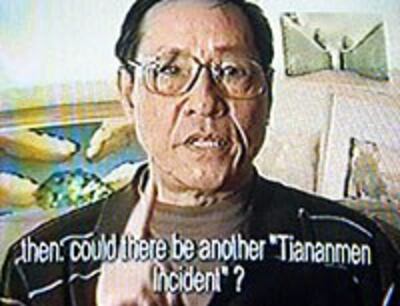
HONG KONG—A former top aide in China's ruling Communist Party has called on the Chinese people to keep up pressure on their government, which he described as "utterly corrupt."
"The pressure exerted by the Chinese people is indeed a good thing; its vice-like grip gives us the best available tool with which to reform an authoritarian, one-party state," wrote Bao Tong, former aide to ousted late premier Zhao Ziyang in an essay broadcast on RFA's Mandarin service Friday.
In a memorial essay written for the 18th anniversary of the June 4 crackdown on the Tiananmen Square pro-democracy movement, Bao also hit out at those who "sold their souls" by pretending that the crackdown was good for China's economy.
'Butcher' Deng Xiaoping
There are always those who are prepared to sell their own souls, who in the past 18 years have praised the massacre perpetrated by that butcher as providing a firm basis for prosperity.
"There are always those who are prepared to sell their own souls, who in the past 18 years have praised the massacre perpetrated by that butcher as providing a firm basis for prosperity, because he broke the will of the people with his iron fist," Bao wrote. "That butcher" refers to the late supreme leader Deng Xiaoping, who is credited with launching China's economic boom.
"This chairman gave the order to the People's Liberation Army to shoulder their assault weapons and drive tanks in a move that crushed and strafed the masters of the country," Bao said.
"The numbers of injured went beyond the capacity of emergency rooms in the capital to handle. The dead were piled up in the morgues," added Bao, who lives in Beijing under constant police surveillance.
"The rest of the world witnessed the bloodbath in China's capital via satellite television. This sort of event, whether it occurred in the slave society or during the time of the warlords, is the sort of crime which has the power to extinguish the human spirit," he wrote.
Bereaved relatives hounded
Hundreds, perhaps thousands, died when the People's Liberation Army used machine guns and tanks to disperse protesters and onlookers in Beijing on the night of June 3, 1989, and in the days that followed.
Relatives of those who died are habitually followed, detained or placed under house arrest at sensitive times, especially in the days surrounding the anniversary of the crackdown, which China currently describes as "political turmoil" caused by troublemakers and correctly dealt with by the authorities.
The New York-based Human Rights in China, which is running an online petition on behalf of the Tiananmen Mothers group, said in a statement on the petition site, Fill the Square: "Without accountability for the crimes committed in the Beijing massacre, there is no justice for the victims or their families."
"The bereaved are not even allowed the dignity of public mourning, and may not lay a bouquet in their memory in Tiananmen Square," said the Web site, which aims to fill Tiananmen Square with virtual bouquets submitted by visitors.
Top Chinese intellectuals have repeatedly called for a reappraisal of the official verdict on the 1989 protests, which were sparked by the death of former ousted Communist Party chief Hu Yaobang, who played a key role in reversing the damaging political verdicts of the Cultural Revolution (1966-76).
And thousands of Hong Kong people habitually gather in that territory's Victoria Park to hold candlelit vigils for those who died, and to call for a change in the official stance.
Bao's essay, a damning indictment of the current regime from an official formerly at the heart of China's corridors of power, joined calls for the government to take responsibility for the massacre.
"Today's leaders are incapable of becoming reformed characters, but they should at least say one sincere thing, utter a note of responsibility, if they wish to rule in a constitutional way, to give China at least some kind of footing on which to begin its long march to democracy," said Bao.
He commented: "An utterly repressive society leads to an utterly corrupt prosperity. Repression has split China down the middle, into a paradise for corrupt officials and a purgatory for those with no power."
Original reporting in Mandarin by RFA's Mandarin service. Essay by Bao Tong. Service director: Jennifer Chou. Translated and written for the Web in English by Luisetta Mudie. Edited by Sarah Jackson-Han.
